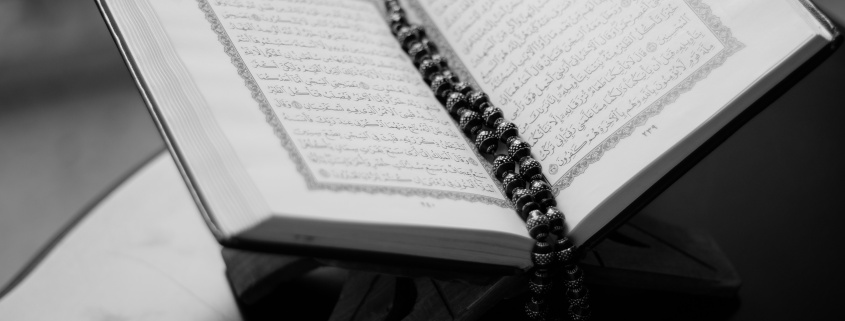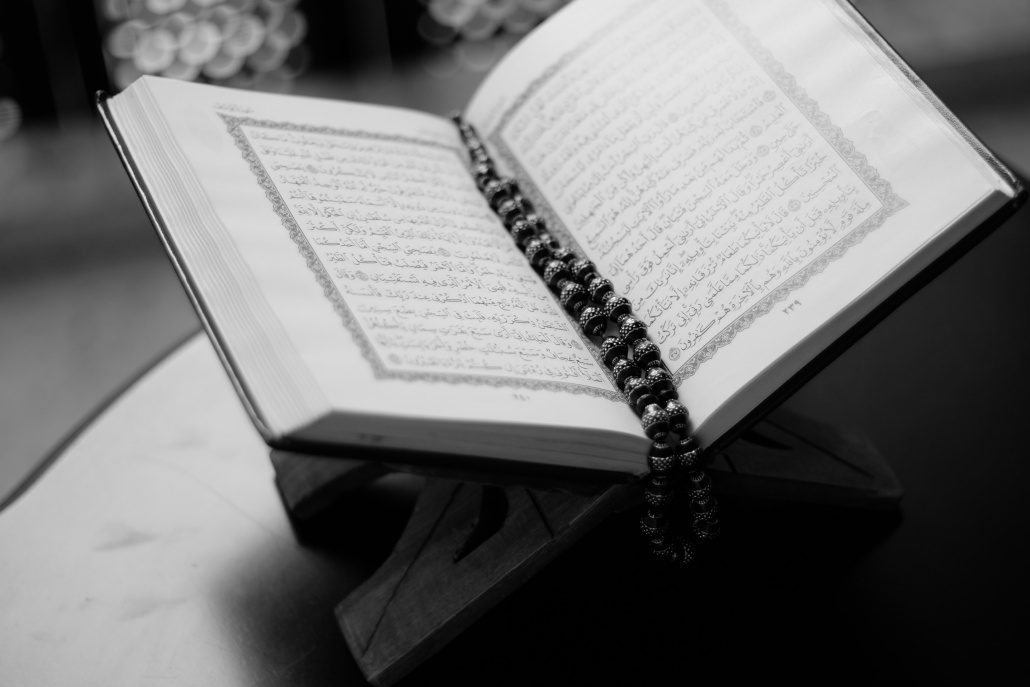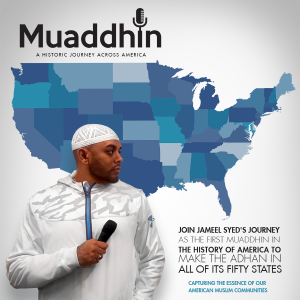“Creeping Sharia”: A Myth?
by Amina Khan
The term “Sharia law” ignites heated arguments as non-Muslims attempt to define it through tenuous sources. However, concurrently, radical Muslims also disseminate false translations of Sharia for the benefit of their own religious extremism and political gain.
So then, what is Sharia and is it something Americans should fear?
History and Origin
Sharia sprouted following the death of the Prophet Muhammad in 632 AD. It derives its essence from the Qur’an and Hadith; yet, conflictions develop as the credibility of Hadith is scrutinized between Muslim scholars. The reliability of a Hadith may have faltered through the “chain of transmission” down the years. If a Hadith contradicts another Hadith or the Qur’an, it cannot be true. Unfortunately, Hadith have been abused under degrading rhetoric and is always undergoing analysis between scholars.
Sharia translates to “the direct path to water”, as it is wholly a practiced way of life for Muslims.
Trying to ban Sharia is denying Muslims their religious freedom. But, Sharia is not a set of laws that are to be forced on anyone against their will as it is stated in the Qur’an that “no compulsion in [acceptance of] the religion” (2:256) is allowed. Furthermore, Sharia is not even a set of laws, but rather a philosophical concept of guidelines that root from the concepts learned in the Qur’an and Hadith. It molds with the society that a Muslim currently resides in; however, it is strictly only for Muslims and is not something that is trying to spread or be forced onto the Western world.
Five Parts of Sharia + Fiqh
The five branches of Sharia are Adab (behavior, morals and manners), ibadah (ritual worship), i’tiqadat (beliefs), mu’amalat (transactions and contracts) and ‘uqubat (punishments). However, it should be noted that these rulings apply to a willing person, not through forced government implementation.
Fiqh means “understanding” and is taught through four different schools (Hanafi, Maliki, Shafi’i, Hanbali) with the common conception that these scholars are not speaking for God. Fiqh is essentially stories of Prophet Muhammad (SAW), Qur’an and Hadith. Unfortunately, the Western view of Sharia and Fiqh is based on how Middle East countries make use of the Islamic laws.
Countries like Saudi Arabia, abuse the nature of Islam to weaken the disposition of Muslims for their own political gain. These countries eradicate the concept of justice that is essential to Sharia, simply to gain power and fuel their extremist views. An honest example of Sharia law is prevalent in America, as freedom of religion, freedom of speech, freedom of expression and freedom of thought are promoted. The Islamic part of Sharia is fully a Muslim’s own spiritual relationship with God in directing themselves to be a better person.
Violence and Punishment in Qur’an + Concept of Hudud
“Whoever kills a person who has a truce with the Muslims will never smell the fragrance of Paradise.” – Saheeh Muslim
It is narrated that Muhammad (SAW) said, “To free someone criminal mistakenly is better than to punish someone innocent mistakenly.” ‘A’isha (ra) narrated, “Ward off punishments as much as you can. If you find any way out for a Muslim then set him free. If the Imam makes a mistake in granting forgiveness it is better for him than that he should commit a mistake in imposing punishment.”
“Avert the Hudud (legal punishments) from being inflicted as much as you can, and whenever you find a way for a release [of a defendant] go through it, since it is better for one who rules to make a mistake in acquitting, than to make it in punishment of the innocent.” (Sunan al-Tirmidhi no. 1424. Classified authentic [sahih] by al-Hakim)
Hudud means the “limits of God”, Jonathan Brown from Yaqeen Institute states, but nowhere does the phrase appear in the clear context of labeling certain crimes (see Quran, 2:229, 4:14, 58:4, 65:1, though 4:14 is followed by a discussion of sexual impropriety). As punishments in Islamic law are formatted by human reason and not by the verses in the Qur’an, there is ample room for error. There are only four undeniable Hudud penalties specified by the Qur’an: 1) Theft; 2) Armed robbery; 3) Illicit sexual intercourse; 4) Slander.
The Qur’an does not command the death penalty for major sins, even murder. The family of the victim of a murder is given the option to forgive a murderer, be given compensation for the murder, or have the murderer killed (2:178). Stoning someone to death is never mentioned in the Qur’an, but is a common practice in some countries who are clearly not following the book accurately.
However, it is important to note that the concept of Hudud is not meant to be implemented into society today, rather it is there to sustain Quranic maqasid of justice/compassion in the specific context of Meccan society at the time.
In a typical book of fiqh, less than 2% of the book is devoted to the Hudud crimes and their punishments.
“Those who commit unlawful sexual intercourse of your women – bring against them four [witnesses] from among you. And if they testify, confine the guilty women to houses until death takes them or Allah ordains for them [another] way. (4:15) But if they repent and correct themselves, leave them alone. Indeed, Allah is ever Accepting of repentance and Merciful (4:16).
“And those who accuse chaste women and then do not produce four witnesses – lash them with eighty lashes and do not accept from them testimony ever after. And those are the defiantly disobedient, Except for those who repent thereafter and reform, for indeed, Allah is Forgiving and Merciful” (read 24:4-9).
Forgiveness is a prime factor in Islam, and punishment is only given if there is substantial evidence of a sin, which is extremely rare. These punishments are scarcely ever used and if they are, it’s used in an extreme and unfitting manner. Also, the Qur’an was revealed 1400 years ago in a time where punishment like prison did not exist. In fact, in the entirety of the Quran of 114 chapters, only three punishments are written: prescribed punishments, retribution, and discretionary punishments. Also, in modern societies, where the vast majority of crimes cannot be examined on the basis of eyewitness evidence and where all kinds of forensic data enabled by scientific advancements have become critical to investigating and prosecuting crimes: there is no need for Hudud to be used.
“And the retribution for an evil act is an evil one like it, but whoever pardons and makes reconciliation – his reward is [due] from Allah . Indeed, He does not like wrongdoers”(42:40).
“And if ye do catch them out, catch them out no worse than they catch you out: But if ye show patience, that is indeed the best (course) for those who are patient” (16:126).
Scholars argue that the verse on theft giving the punishment of cutting off one’s hand is mistranslated. You shall “eqta’u” the thief’s hands as a punishment for their deeds, and to serve as a deterrent from God. The word “eqta’u” is normally used along the lines of ‘marking’ or ‘leaving a scar’ where as “batara” would mean to “cut off”. In Qur’an 108:3, “Indeed, your enemy is the one cut off” (abtar – a derivative from batara).
This can be further argued in the story of Joseph:
“So when she heard of their scheming, she sent for them and prepared for them a banquet and gave each one of them a knife and said [to Joseph], ‘Come out before them.’ And when they saw him, they greatly admired him and cut their hands and said, ‘Perfect is Allah ! This is not a man; this is none but a noble angel.’” (12:31). “Eqta’u is also used in 5:38.
As for other violent verses of war, are only written in the Qur’an as explanations for wars that happened at that time, like the Battle of Badr. However, people of ISIS and Taliban take these verses and use it to cowardly support their own horrendous actions of war and savagery.
In a hadith of an underpaid child who stole fruit from his employer was brought to Prophet Muhammad (SAW) by the employer who demanded the child’s hand be cut. Upon seeing that the child suffered from hunger, Prophet Muhammad (SAW) rebuked the employer for underpayment and made it obligatory on him to educate the child and provide proper food to him until he grows up. This hadith makes up several of examples of Prophet Muhammad’s way of promoting justice where it is necessary. Among forgiveness in Islam, a good deed can also wipe away sin, as narrated in a hadith of a prostitute whose sins were forgiven simply because she gave water to a thirsty dog.
Hiraba
The harshest punishment written in the Qur’an is 5:33. Majority of Muslim scholars deem this verse was revealed after men had blinded, maimed and murdered a shepherd while also stealing his camels. Prophet Muhammad (SAW) ordered the killers to be punished in the same manner. However, some scholars argue that these reports are skeptical. Nevertheless, it is stressed that the ruler or state has the preference in deciding the proper punishment for Hiraba.
Terrorism is classified as Hiraba, which is punishable by death, as Hiraba means “waging war against a society”. Therefore, Islam heavily supports the notion that groups like ISIS are to be punished.
Misconceptions of Jihad
Opposite of Hiraba is Jihad. The term Jihad has been abused to hold a negative connotation juxtaposing its true meaning in Islam. People who do abuse the term are disregarding Islam’s immaculate history of consistency to the standards of law and justice in affairs of state. Jihad in Arabic means to “strive for some objective”. Countries who use Jihad for unwarranted violence and propaganda have been misguided and are neglecting Islamic conditions. It has become a norm for cultural society to define Jihad as rebellions against authority, which stressfully denounce Islamic principles.
Spiritual Jihad’s goal is to diminish demeaning characteristics by practicing dhikr, the Remembrance of God.
Jihad essentially means to “struggle” and is overall an internal and external way to be a good Muslim. The only reference of Jihad to violence is when Prophet Muhammad (SAW) mentioned to his followers on the way back from military campaign that a transition was made from armed battle to the peaceful battle, enforcing the idea of a “just war” and terms of defensive battles.
Islam’s Tolerance of Other Religions
“After Muhammad’s death, Jews and Christians were never required to convert to Islam but were allowed to practice their religions freely in the Islamic empire. Later Zoroastrians, Hindus, Buddhists, and Sikhs were also counted among the People of the Book. It has never been a problem for Muslims to coexist with people of other religions. The Islamic empire was able to play host to Christians and Jews for centuries, but Western Europe has found it almost impossible to tolerate Muslims and Jews in Christian territory.” – Karen Armstrong
“Beware! Whoever is cruel and hard on a non-Muslim minority, or curtails their rights, or burdens them with more than they can bear, or takes anything from them against their free will; I (Prophet Muhammad) will complain against the person on the Day of Judgment.” – Abu Dawud
“You will surely find the most intense of the people in animosity toward the believers [to be] the Jews and those who associate others with Allah , and you will find the nearest of them in affection to the believers those who say, “We are Christians.” That is because among them are priests and monks and because they are not arrogant” (5:82).
Several Quranic verses denounce the ostracization of any religion besides Islam. Misconfigurations of verses stating the murder of non-Believers repudiate the understanding of historical context at that time. Meccan “Pagans” had waged war against the Prophet Muhammad (SAW) and his community, while they violently oppressed and tortured Muhammad and his followers. Eventually, after several assassination attempts on Muhammad, various hostile Arab tribes joined in the fight against the Muslims, cultivating the Battle of the Trench, when 10,000 soldiers from many Arab tribes gathered to take out the entirety of the Muslim community. Muslims survived this war and went onto civilization.
As mentioned in the Huffington Post, the verses that come immediately before 9:5 state, “Those with whom you have treaties are immune from attack.” It further states, “Fulfill your treaties with them to the end of their term, for God loves the conscientious.” Now, in its proper context, verse 9:5 can be accurately understood.
“Creeping Sharia” is a non-existent movement. Sharia is not here to “take over” the world and convert everyone to Islam as Allah (SWT) “guides whomever He wills”. The violence that is so prevalent in the Middle East has no relation to religion, rather it capitalizes globalization and colonialism. Muslims are victims under those who use the name of Islam for their own political agenda to obtain power and sustain greed. Sharia has no intention to be violent, unless drastic sins like those ISIS is committing, then punishment is deemed to be fitting. Above all, forgiveness is dramatically portrayed in Islam, punishment is not something that should easily be given. It is important to understand the correct principles of Islam, and digest the violent terms in the Qur’an as verses that befitted society at that time and era.


















2017
4,536 views
views
0
comments